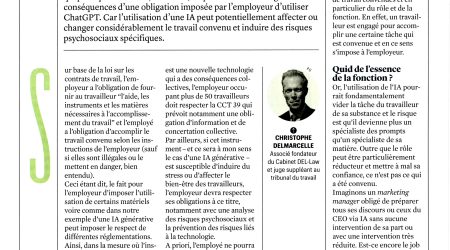Volkswagen plans to cut wages by 10% is this legal?
Posted the 6 November 2024In view of Europe's blindness to economic realities, Europe is drinking the cup, weighed down by unsustainable standards, wage and energy costs and electricity production obligations.
Volkswagen is thus considering, among various drastic cost-cutting measures such as closing three plants in Germany, cutting wages by10%.
Faced with a crisis, employers often have no choice but to slash costs. To avoid, or at least limit, the need for redundancies, the option of a pay cut is a tool often put on the table.
From a Belgian perspective, can an employer touch your salary?
As for the base salary, the answer is clearly no, at least not without your agreement. A unilateral reduction in salary would be considered a modification of an essential element of the employment contract and, if attempted, the employer could be ordered to pay the difference, not to mention the risk that the employee might argue that the employer has breached the employment contract.
Under what conditions?
As for supplementary benefits (company car, group insurance, etc.), things are a bit less clear. The clause in which the employer reserves the right to modify a contractual element is, in fact, null if that element is considered "essential," which is normally the case with remuneration.
Three questions arise: are the benefits contractual? Did the employer reserve the right to modify them? And, are they "essential" elements of the employment contract?
Some employers indeed grant benefits, especially during a career, without mentioning them in the employment contract or having an agreement with the employee. This is sometimes the case with drinks offered in the cafeteria or the mobile phone provided.
In principle, they can be unilaterally modified, although the employee could argue having a right to them due to constant usage or custom.
What is contractual or not?
Another example: the granting of a company car may be based on a "car policy," which can be modified.
For group insurance, suspending or unilaterally reducing employer contributions is likely to be considered unlawful, as case law treats these contributions as part of the remuneration. Regarding hospitalization insurance, the employer has the right to modify the specific conditions of the plan (such as the deductible, ceiling, covered expenses, etc.), which are generally not contractual.
The problem is that it is sometimes very difficult to determine what is contractual or not, and often, it will be up to the judge to decide. The judge may be influenced by the scale of the benefit or its remunerative nature.
When the element is contractual, the question will focus on its "essential" nature. Since remuneration is normally considered essential, no modification would be possible without consent.
In the issue of changing working conditions, the employee is not defenseless, and if the employer provides parking, drinks, a car, or a mobile phone and decides to withdraw the benefit, the employee may be able to oppose this.
However, the question for many employees will often be whether it is worth opposing and whether preserving their job in the long term is not the most important thing in the current crisis context.
Better to seek consensus
Some employers may be tempted to push through by relying on a lack of reaction, tacit consent, from a large majority of employees.
However, transparency and obtaining some form of consensus, or even involving employees in efforts during a crisis, should certainly be prioritized. It is conceivable to agree to reduce wages, modify bonus conditions, or adopt new conventions on the private use of a laptop and mobile phone.
If the company is under pressure, the employee may find it reasonable to give up part of their package to preserve their job, with the only obligation being not to fall below the minimum wage.
Studies show that many employees are willing to make efforts, for example, by adopting part-time work to avoid the dismissal of a colleague...
Related articles

Is an employer allowed to mandate the use of artificial intelligence tools by employees ? (Trends, 17-07-2025)

Caution if a former colleague opposed to your employer asks you to testify in their favor
